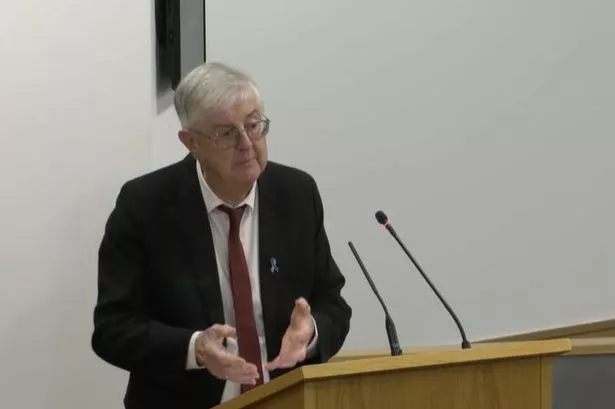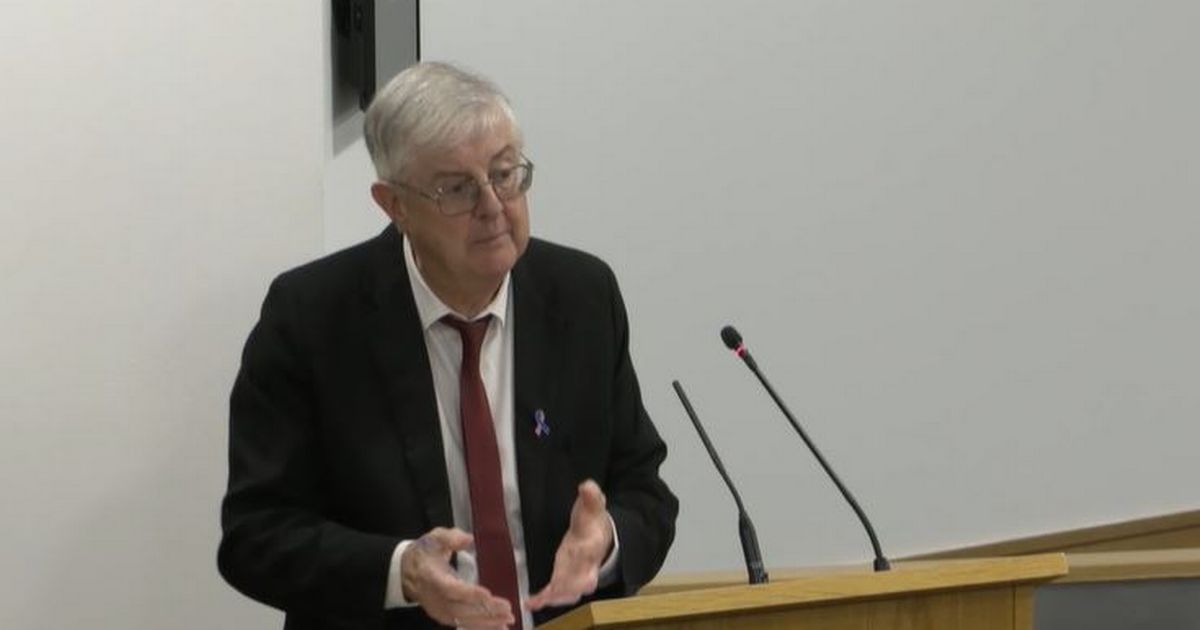Filling a gap from Welsh Government funding could see 20% rises in council tax, they have warned Mark Drakeford announcing the draft budget to the Senedd
Mark Drakeford announcing the draft budget to the Senedd
Welsh councils have said that if the Welsh Government’s budget goes ahead as has been announced, it could result in council tax having to rise by 20%, or more than 13,000 council jobs having to be cut across Wales.
The Welsh Government has today published its draft budget. Mark Drakeford, Wales’ finance minister, has said the current draft is a budget which is effectively identical to last year’s but with a 2% rise to allow for inflation.
However, the Welsh Local Government Association (WLGA), which represents all Wales’ 22 councils, said the settlement they would receive under his proposal would have a crippling impact and “to cover the expected gap, councils may have to raise council tax by 20% or cut thousands of jobs”.
Projections from the WLGA’s finance group show that the 2.5% settlement proposed would leave an estimated shortfall of £405m. That could be covered by the equivalent of a 20% rise in council tax, or 13,049 jobs being cut.
A WLGA spokesperson said: “Councils see why today’s draft budget was set out, and they welcome the average 2.5% rise in core funding along with ongoing support for social care and childcare. Still, this does not fully address the challenges local authorities face in maintaining essential services and supporting those who depend on them. To cover the expected gap, councils may have to raise council tax by 20% or cut thousands of jobs. For our free daily briefing on the biggest issues facing the nation, sign up to the Wales Matters newsletter here
“Costs are rising across the board, and demand for services like social care and homelessness support continues to grow. This funding will help, but it doesn’t remove the tough choices ahead. We’ll keep working closely with Welsh Government on how grants are shared out and on exploring new flexibilities that could give councils a bit more breathing room and strengthen their spending power over the next year.
“A full budget, allocating all available resources, would be preferable to a roll-over budget.”
Mr Drakeford has said there is £380m unallocated in his spending plans. The presumption was that money would be used to offer other parties concessions in order to secure their votes, however he will be under pressure to help councils.
Speaking to WalesOnline, Mr Drakeford said: “I’m very determined to work with local government to avoid some of those outcomes. I can’t avoid them if there’s no budget, I can help to avoid them provided we do pass a budget, either by using some of the £380m of not allocated so far to bolster the budgets of local authorities, or to find other innovative ways which we are discussing with local authority colleagues.
“We could still find a path for them to be able to set a budget that protects their services and doesn’t result in the sort of rises in council tax that they’ve been talking about.
“But if we don’t have a budget none of that becomes relevant,” he said.
The budget for 2026-27 is crucial and finely balanced. Labour, which is in power in Wales, does not have the numbers to vote through the budget on its own and will need help from politicians from other parties in the Senedd.
Should the government fail to pass the budget by the time the Senedd is dissolved in March, ahead of the election in May, the only money available is 75% of this year’s budget.
Mr Drakeford has urged colleagues to work with the Welsh Government to make sure the budget passes. He says the draft budget he has put forward “provides a stable platform on which public services can plan in the run-up to the Senedd election”.
But he warned politicians would have come to an agreement because not passing a budget would be “catastrophic”.
Responding to colleagues after questions in the chamber, he said: “This is not a debate about theoretical decision, not a debate in a debating society – it is a debate in a place that is going to make one of the consequential decisions in the lives our fellow citizens that any parliament of this sort makes.
“The failure to pass a budget is genuinely catastrophic. Catastrophic to the reputation of the Senedd, undermining to the reputation of devolution, but most of all catastrophic in the lives of those thousands of people without a service, without a job, without a prospect we can hold out in front of them that things can improve in the future.”
He added, during an interview with WalesOnline, that it was “important” to “pay special attention to local government”.
If the budget does not pass before councils are obliged to finalise their budgets, then shortages will be acutely felt by them, he said.
“I’m very determined that we pay special attention to the needs of local government as we move towards the final vote, because failing to pass the budget has such a direct and immediate impact on everything they do.
“We’re not now talking about things at the edge of what they do, we’re talking about people who sit at home waiting for the home help to arrive, and that doesn’t happen.
“We’re talking about children who need looking after where that service has collapsed. I don’t want to catastrophise things because I was heartened by the fact that I thought there was a recognition around the chamber today of our shared responsibility to make sure that doesn’t happen, but that’s what I’m going to be focussed on, not talking up the bad things that would happen if we failed, but making sure that we succeed.”
Within the debate in the Senedd, Plaid Cymru’s Heledd Fychan told Senedd members. “As the negotiations proceed, I look forward to playing a full part in the scrutiny process. We would be more than happy, of course, to be involved in that through committees and directly to see how we can secure our public services.
“The warnings have been clear, so there is a requirement on us to be mature in our approach to this debate in the coming months. I look forward to hearing more comments during this afternoon’s debate, and I look forward to things progressing over the next weeks and months.”
Lib Dem Jane Dodds echoed that: “I want to start by being really clear that I am prepared and willing to work with any party to find a constructive way forward in this budget, as I did last year”.
The Welsh Conservatives had earlier written to the First Minister to say it would have discussions with her if she would consider scrapping the Welsh equivalent of stamp duty. Speaking in the weekly First Minister’s Questions before the budget debate, she did not rule out meeting them on that basis.
